Judi Lynn
Judi Lynn's JournalMy Brother's Keeper: a former Guantnamo detainee, his guard and their unlikely friendship
February 2021
Former Guantánamo detainee, Mohamedou Ould Salahi, and his guard, Steve Wood, reunite in Mauritania 13 years after last seeing each other, rekindling an unlikely relationship that profoundly changed their lives.
Mohamedou was a prisoner at Guantánamo Bay for 14 years. During his incarceration he was subjected to torture and solitary confinement, but never charged with a crime. His memoir, Guantánamo Diary, became an international bestseller and was adapted into the film, The Mauritanian, starring Tahar Rahim and Jodie Foster.
My Brother's Keeper is BAFTA longlisted for British Short Film 2021.
Read exclusive extracts and listen to audio readings from Mohamedou's book on the Guardian.
https://www.theguardian.com/world/ng-interactive/2021/feb/23/my-brothers-keeper-a-former-guantanamo-detainee-his-guard-and-their-unlikely-friendship
The president's bosses Part 3: Colombia's mafia
by Adriaan Alsema February 22, 2021
Colombia’s drug traffickers have claimed buying political support for decades, a practice that now threatens to turn the country into a mafia state.
The ties between President Ivan Duque and his country’s drug traffickers may be among the most evident, but they are not unique.
Narcos and their money laundering associates have allegedly been financing presidential campaigns since 1978 in an attempt to obtain the political power of the country’s private sector.
The origin
The first president accused of receiving drug money to finance his campaign was late President Julio Cesar Turbay, who reportedly received financial support from the father of President Alvaro Uribe, a Medellin Cartel associate, in 1978.
More:
https://colombiareports.com/the-presidents-bosses-part-3-colombias-mafia/
The president's bosses Part 1: Colombia's business associations
by Adriaan Alsema February 18, 2021
The power of Colombia’s president depends on his ability to manage the sometimes opposing interests of those who really control the country, like business associations.
While formally a democracy, all presidents of the 21st century have had no choice but to balance serving the public interest with private and even criminal interests.
This unstable balance of power is partly due to the country’s political history and culture, and partly a consequence of the country’s armed conflict.
~ ~ ~
The violence that followed between those who wanted a united Colombia and those who wanted a loose federation of independent states may best be compared with the American Civil War.
It wasn’t until 1819 that the different regions agreed to becoming one Republic, but led to multiple secessions and rebellions throughout Colombia’s history.
More:
https://colombiareports.com/the-presidents-bosses-part-1-colombias-business-associations/
Arrest of Congressman Daniel Silveira after Attacks on Court Justices
Decision will be submitted to the House which may maintain or overturn order
Feb.17.2021 1:43PM
Marcelo Rocha
Renato Machado
Ricardo Della Coletta
BRASÍLIA
Supreme Court Justice Alexandre de Moraes ordered the arrest of congressman Daniel Silveira (PSL-RJ), on Tuesday night (16).
Silveira is the target of two inquiries at court - one investigating anti-democratic acts and the other, fake news. Moraes is the rapporteur for both cases, and the arrest warrant was issued in the fake news investigation.
Silveira published a video attacking the Supreme Court justices. When he was arrested, he returned to social media: "Justice, I want you to know that you are going into an arm wrestling that you cannot win. There is no use trying to shut me up," he said.
. . .
Moraes also says that Silveira defended "the immediate replacement of all justice [of the STF]" and instigated "the adoption of violent measures against their life and security, in clear affront to democratic, republican principles and the separation of powers".
The bolsonarista is the same one who broke a plaque with the name of councilor Marielle Franco (PSOL), murdered in Rio de Janeiro in 2018.
https://www1.folha.uol.com.br/internacional/en/brazil/2021/02/supreme-court-justice-moraes-orders-arrest-of-congressman-daniel-silveira-after-attacks-on-court-justices.shtml?utm_source=newsletter&utm_medium=email&utm_campaign=newsen
(As you may recall, Marielle Franco, the beloved City Council member who was also the voice of the poor of Rio de Janeiro, was assassinated by some off-duty policemen with ties to the Bolsonaro family, an act which horrified a huge part of Brazil. Marielle Franco was gunned down while riding in her car with her driver/body guard, who had just become a new father a short time before. Clearly the violent right-wing wanted to silence her before she became more well known, more "powerful".)
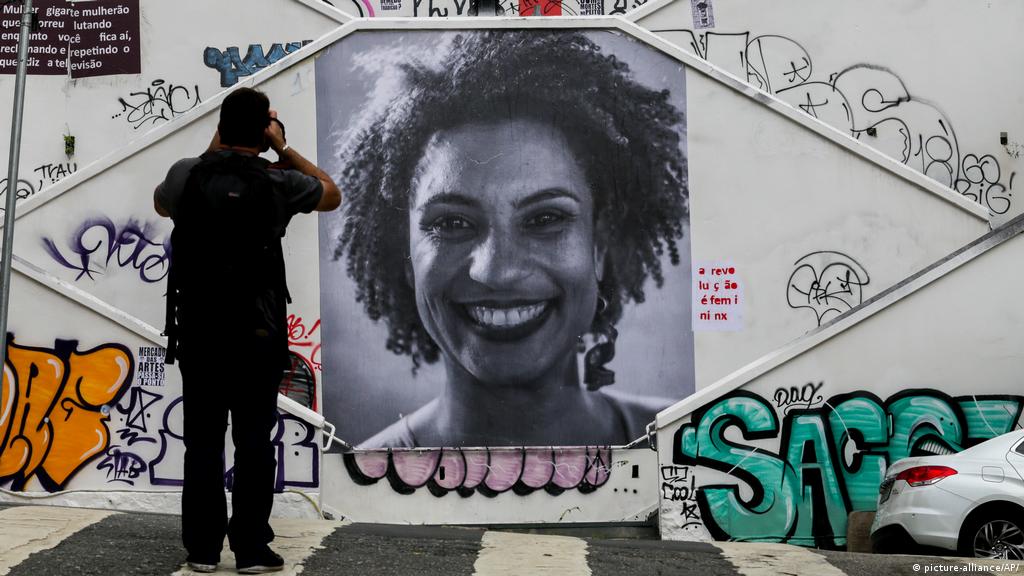
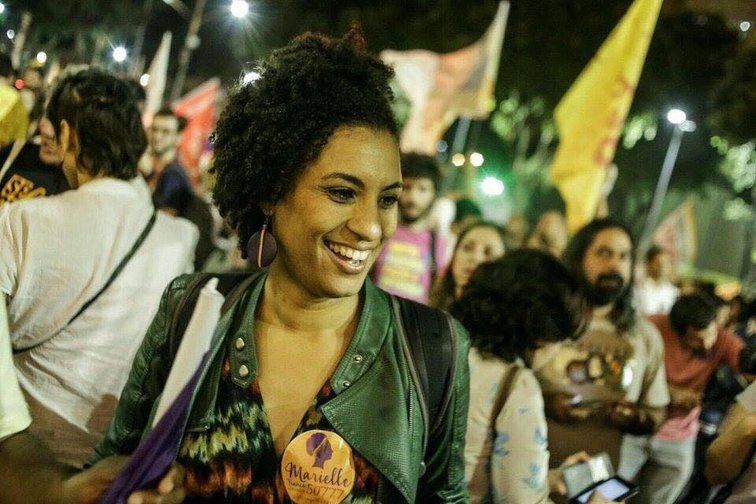
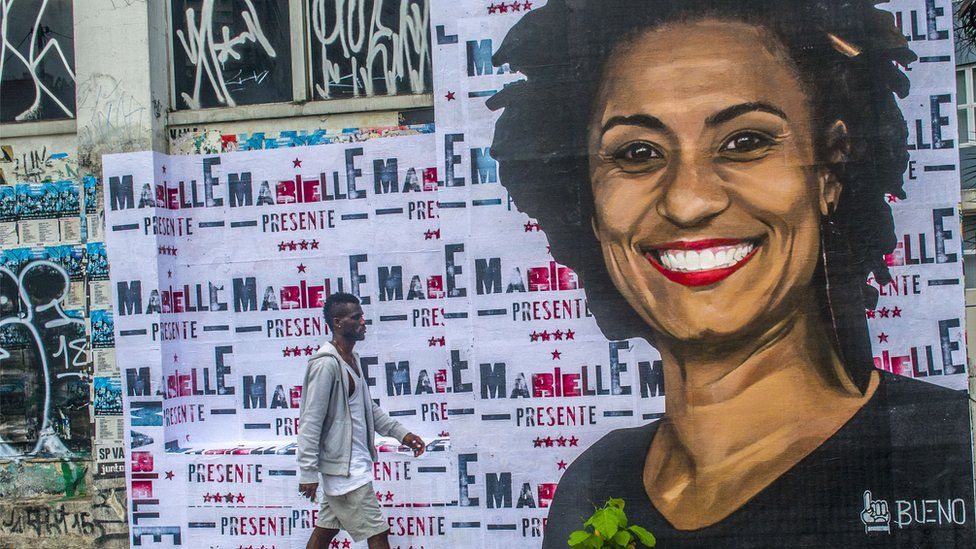

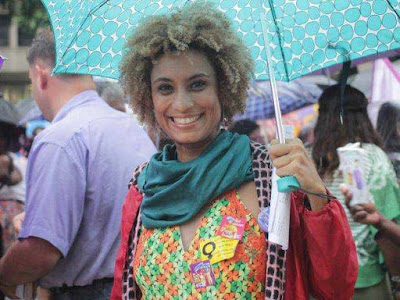



Crowd gathering for Marielle Franco's wake

Ex-officers arrested for the assassinations.

Her work will be continued, her life will not have been in vain.
Luis Arce's Bolivia and the new regionalism in Latin America
Is the renewed ascendancy of leftism in countries like Bolivia and Ecuador a sign that the ‘Pink Tide’ is returning?
Owen Schalk / February 16, 2021

Bolivian President Luis Arce speaks during the 2015 International Economic Forum on Latin America and the Caribbean. Photo courtesy the OECD Development Centre/Flickr.
“Our movement is unique in the world,” said former Bolivian president and leader of the Movement Toward Socialism (MAS) Evo Morales upon his return from exile on November 9, 2020. “The Indigenous sector is the one most threatened with extermination, discriminated, marginalized, and we promoted and created a political movement for the liberation of our country.” Although it is true that the MAS movement is “unique in the world” as Morales stated, largely owing to Bolivia’s unique demographics (approximately half of the population identify as Indigenous), its success is also an inspiring indication of progressive resistance across Latin America and the Caribbean.
The MAS’s fight for Indigenous, anti-imperialist interests has continued, but without Morales at the helm. Luis Arce, a left-wing economist and Minister of Economy and Public Finance under Morales (2006-2019), was sworn in on November 8, 2020, following almost one year of right-wing violence from an authoritarian coup government supported by the United States, Canada, the European Union, and the Organization of American States under Luis Almagro (who has also followed Washington’s line on Venezuela, Cuba, and Nicaragua). The coup government of Jeanine Áñez oversaw a program of privatization, immense borrowing from the International Monetary Fund, and suppression of Indigenous movements, as well as isolation from regional organizations intended to limit the influence of the Global North on Latin American and Caribbean economic policy, such as the Bolivarian Alliance for the Peoples of Our America (ALBA) and the Union of South American Nations (UNASUR).
ALBA and UNASUR are important organizations for the integration of left-wing, anti-imperialist governments in Latin America. In his speech at the United Nations in 2011, Hugo Chávez labelled this push for integration “[the] new regionalism,” and said that ALBA exists as an “experiment of progressive and anti-imperialist governments, seeking ways to break the prevailing international order,” while UNASUR is “a political bloc that federates the 12 sovereign States of South America with the purpose of grouping them under what the Liberator Simón Bolivar called ‘a Nation of Republics.’” This new regionalism is what the US-backed government of Áñez tried, and failed, to destroy in Bolivia. The MAS won the 2020 election with a staggering 55 percent of the vote (the next most popular party, headed by Carlos Mesa, received 28 percent) and President Arce promptly asserted his mandate by rejoining these alliances for the economic integration of progressive Latin American governments.
ALBA used to include Manuel Zelaya’s Honduras and Rafael Correa’s Ecuador, but Honduras left following the 2009 coup and Ecuador withdrew during the neoliberal reign of Lenin Moreno. Furthermore, it is important to note that the three observer states to ALBA are Haiti, Iran, and Syria. These observer nations gesture toward the greater threat that new regionalist organizations pose to US hegemony. In the Middle East, Iran and Syria represent two of Washington’s biggest targets due to their independent economic policy and refusal to bow to Western imperialism. Their observer status in ALBA indicates the larger counter-hegemonic trends that are developing across the Global South and help to explain why the right-wing coup government of Áñez was so quick to reverse these Morales-era alliances.

Former Ecuadorian President Rafael Correa (middle) and Evo Morales (right) in Cochabamba, Bolivia, June 4, 2012. Photo courtesy the Cancillería del Ecuador/Flickr.
More:
https://canadiandimension.com/articles/view/arces-bolivia-and-the-new-regionalism-in-latin-america

The little Teflon Assassin, Massacre-Meister, Alvaro Uribe, manipulator of spies and death
squads, not comfortable with non-fascists during inauguration of Evo Morales, in Bolivia.

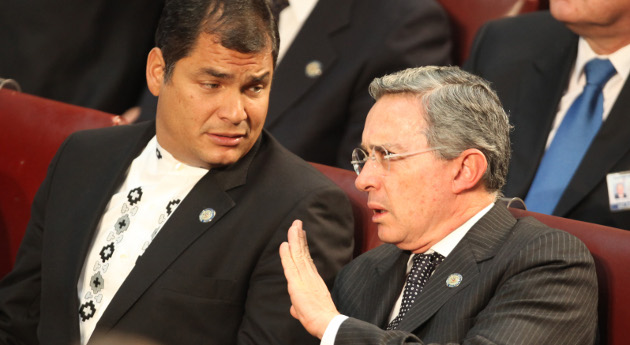
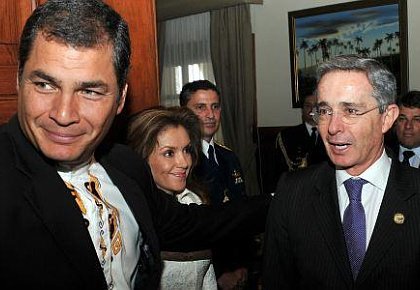
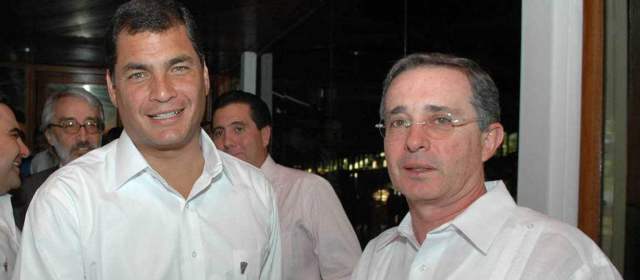

"May I be excused?"
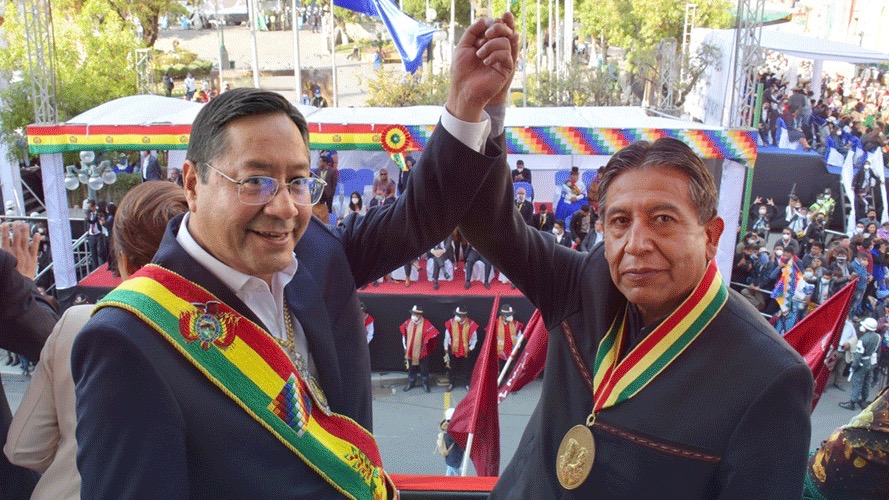
President Luis Arce and Vice President David Choquehuanca, Native Bolivians, still referred to as "llama abortions, "f***ing Indians" by the ruling minority class, the Europeans. Their parents, grandparents weren't allowed to vote or even walk on the same sidewalks with the white minority rulers before a revolution in 1952.
Ignoring Repression and Dirty Tricks in Coverage of Ecuador's Election
FEBRUARY 16, 2021
JOE EMERSBERGER
Ecuadorians went to the polls on February 7 to elect a new president, vice president and National Assembly. A week before the election, a widely reposted Reuters article (1/29/21) by Alexandra Valencia and Venezuela-based reporter Brian Ellsworth explained that “nostalgia for better times under former leftist president Rafael Correa has pushed one of his proteges into the lead.” The protégé in question is Andrés Arauz, a 36-year-old economist who was part of the Correa government’s economic team, including a stint as head of its central bank, during the ten years that it was in office (2007–17).
Lies of omission characterize Reuters coverage of Latin American politics (FAIR.org, 12/17/19, 6/14/19). This article was no exception. There was no mention in the article that Arauz was almost not allowed on the ballot at all.
As I explained in August (FAIR.org, 8/17/20), over the past four years, Correa’s allies have not been allowed to register as a new political party, and have had to resort to running under the banner of already-existing parties. The election results have confirmed once again (as did regional elections in 2019) that Correa’s political allies are the largest political force in the country. How could the CNE get away with denying them their own party? Why would Reuters fail to mention, never mind explore, that very significant fact?
By August, the CNE had effectively banned one of the parties allied with Correaists, a maneuver that almost succeeded in disqualifying Arauz—the candidate who just won the first round of the election by 13 percentage points over his closest rival. On October 30, with three votes in favor and two abstentions, the National Electoral Council (CNE) finally allowed Arauz’s candidacy. Still, a week before the election, one CNE member made a last-ditch attempt to have Arauz disqualified.
More:
https://fair.org/home/ignoring-repression-and-dirty-tricks-in-coverage-of-ecuadors-election/
Cuban official asks Biden's gov't to reconsider sanctions
Associated Press
Feb. 11, 2021
Updated: Feb. 11, 2021 8:24 p.m.
HAVANA (AP) — A top Cuban official said on Thursday that declassified U.S. documents pointing out deficiencies in the response to health issues reported by American diplomats on the island show some of the falsehoods the Trump administration used to impose measures against Cuba.
Johana Tablada, deputy director for U.S. affairs at Cuba's Foreign Ministry, said the new U.S. government should consider reversing measures imposed by Trump against the island after tensions increased because of the health incidents and other issues.
Between late 2016 and May 2018, several U.S. and Canadian diplomats in Havana complained of health problems from an unknown cause. Trump's administration officials suggested that Cuba may have been behind the incidents or allowed alleged sonic attacks against the diplomats, something the island has always denied.
A declassified assessment by the State Department, made public on Wednesday by the nonprofit National Security Archive, indicated there was a poor response to the incidents and a lack of coordination. The report was completed in 2018, but not released publicly, and it's not conclusive about what caused the reported health problems.
. . .
President Joe Biden’s government has promised to renew relations with Cuba.
More:
https://www.chron.com/news/article/Cuban-official-asks-Biden-s-gov-t-to-reconsider-15944533.php#taboola-2
Sources: Biden officials snub Salvadoran leader in DC trip
JOSHUA GOODMAN,
Associated Press Writer
Feb. 8, 2021
Updated: Feb. 9, 2021 1:20 a.m.
MIAMI (AP) — The Biden administration turned down a meeting request with El Salvador’s president on an unannounced trip to Washington last week, as criticism of the Central American leader mounts among Democrats, three people with knowledge of the decision said Monday.
The trip by Nayib Bukele, which has not been previously reported, came after a senior White House official warned in an interview with a Salvadoran news outlet highly critical of Bukele that the Biden administration expected to have “differences” with him.
Bukele was quick to embrace former President Donald Trump’s hardline immigration policies restricting asylum requests, which won him a great deal of U.S. support for his tough governing style in El Salvador, where he is popular. But like other world leaders befriended by Trump, he faces an uphill climb pivoting to the Biden administration, which is seeking to undo those policies and has signaled its relationship with El Salvador is under review.
The president’s surprise trip amid a pandemic posed a dilemma for U.S. policy makers. They were given little advance notice and are mostly avoiding in-person meetings due to the coronavirus and because many senior positions remain vacant, said the the three people, all of whom are in Washington and insisted on speaking anonymously in return for discussing internal decision-making.
More:
https://www.chron.com/news/article/Sources-Biden-officials-snub-Salvadoran-leader-15934708.php
~ ~ ~
A Wrecking Ball Moment: How Bukele’s Personal Power Grab Is Evidence of a Dangerous Ignorance of History
Héctor Lindo
Thursday, 13 de february de 2020

The president of El Salvador, Nayib Bukele, accompanied by armed soldiers outside the
doors of the Legislative Assembly. Photo of El Faro: Carlos Barrera
The front page of last Sunday’s papers in El Salvador had different versions of the same jarring scene that president Nayib Bukele had staged for the media. The photos of the event showed the millennial head of state surrounded by heavily armed soldiers, his casual attire in sharp contrast with the bulletproof vests and automatic guns of the men around him. They were conspicuously out of place, presiding over the room where the national legislature meets, the “Salón Azul.” And yet something was missing. The operatic moment was marred by the absence of the majority of congress members. The carefully conceived staging was, therefore, missing the key ingredient of cowed deputies surrendering to the power of Nayib. Their absence blocked the president from achieving his goal of forcing the legislature to approve a loan to finance his anti-gang signature plan.
It was ironic for a president so notoriously unmoored in history to be the protagonist of a tableau vivant which, unwittingly, elicited profound historical resonance.
Bukele sees himself as the permanent replacement of the two political parties—the rightwing Nationalist Republican Alliance, or ARENA; and the leftwing Farabundo Martí National Liberation Front, or FMLN—that have dominated Salvadoran politics for the past three decades. To Bukele and his supporters, his election marked the end of the post-civil war era. His government downplays the commemoration of the signing of the Peace Accords that marked the end of El Salvador’s painful war. He is bringing to power a new generation, and signals the change by eschewing a tie, wearing garishly colored socks, and by his savvy social media presence. In a moment of maximum international exposure, during his speech at the United Nations, he took a selfie. His most celebrated tweet describing himself as “The coolest and handsomest president in the entire world” was characteristically narcissistic and non-ideological.
Given his norm-breaking behavior, governing-by-tweet politics, disparaging of the press, ignorance of the importance of checks and balances, cavalier attitude to the rule of law, self-aggrandizement, interest in TV ratings, and tendency to demean opponents, outsiders see in president Bukele a follower of examples set further south in Brazil or, perhaps, north of Mexico. Someone I know refers to him as “nano Trump”.
Bukele pays little attention to history. Having done a somersault over the post-war period, he now hopes to move on and consolidate his power. But the army that is cooperating with him cannot forget the past. An ongoing trial has forced military officers to acknowledge their role in the horrific massacre of El Mozote, the sanguinary episode of the civil war when almost a thousand innocent civilians were slaughtered by the army’s elite unit, the Atlacatl Battalion. Military officers are also profoundly interested in reviving the amnesty law that protected them from prosecution for crimes against humanity before it was declared unconstitutional by the Supreme Court.
Meanwhile, the young president mimics the norm-busting ways of twenty first century role models such as Trump and Bolsonaro. But it takes a profound ignorance of Salvadoran history to repeat its worst mistakes with such casualness. Bukele’s actions on February 9 repeated the twentieth century Salvadoran tactic of powerful civilians seeking alliances with the armed forces to achieve their goals. For most of the past century, an alliance between the Salvadoran Army and powerful civilians controlled the legislature, rigged elections, enjoyed a complicit press, and violently repressed any political participation outside the narrow boundaries imposed from above.
More:
https://elfaro.net/en/202002/el_salvador/24022/A-Wrecking-Ball-Moment-How-Bukele%E2%80%99s-Personal-Power-Grab-Is-Evidence-of-a-Dangerous-Ignorance-of-History.htm
~ ~ ~
El Salvador’s Army, with the President’s Help, Blocks El Mozote Massacre Investigation
Published in:
Los Angeles Times en Español
Author image
José Miguel Vivanco
Executive Director, Americas Division
@JMVivancoHRW
@JMVivancoHRW
On the morning of September 21, a judge arrived at military headquarters in San Salvador with a warrant to review the military’s records regarding the 1981 El Mozote massacre, one of the largest mass killings in modern Latin American history. Soldiers blocked the judge from entering, blatantly refusing to comply with the judicial order. The judge went to six other military facilities in the following weeks. Each time, soldiers prevented the judge from examining the records.
It came as a slap in the face to Salvadorans reckoning with one of the most horrific episodes in the country’s 12-year civil war. It also signaled a reversal of President Nayib Bukele’s commitment to guarantee access to military records.
Three days after the judge’s first attempt to execute the order, President Bukele explicitly backed the military’s refusal. The judge, he said, “ha[d] no jurisdiction over the Armed Forces.” Bukele also asserted that the president was the only authority entitled to declassify military files.
To deflect attention from the military’s disregard for the order, President Bukele accused the judge of responding to “political interests.”
Nearly 40 years after the massacre, the memory of its brutality still shakes Salvadorans. The massive scale of the atrocity is part of the horror. Between December 11 and December 13, 1981, the Salvadoran Army killed 978 people, including 533 children, in and around the town of El Mozote. The Atlacatl Battalion, a US-trained military force that had been dispatched to the area to fight leftist guerrillas, took unarmed civilian villagers from their houses in the middle of the night and killed almost all of them. Many were raped and tortured.
More:
https://www.hrw.org/news/2020/11/09/el-salvadors-army-presidents-help-blocks-el-mozote-massacre-investigation
~ ~ ~

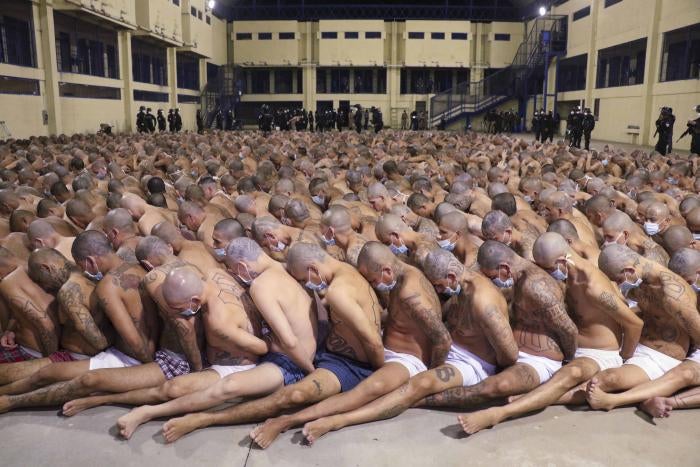

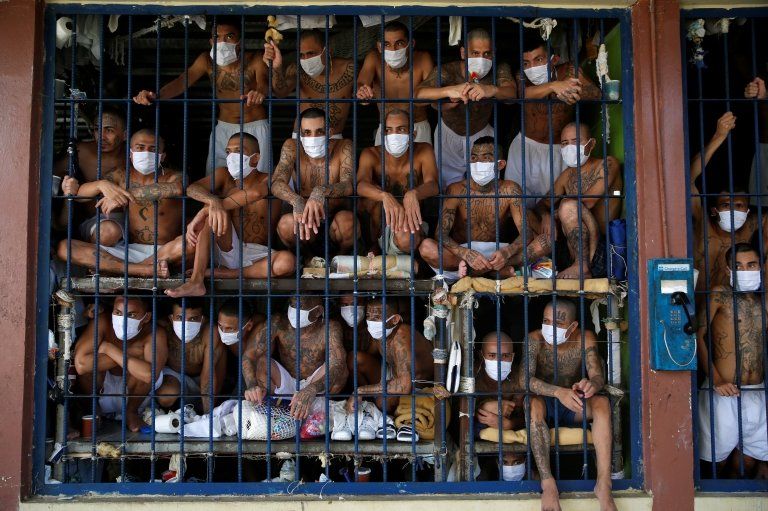
This is the way Bukele feels best for the treatment of El Salvador's prisoners during the lethal Covid-19 situation inside his prisons.


Bukele and his orange friend.
Uncovering The Vibrant City Life Of Ancient Cahokia
From towering earthen pyramids to bustling ceremonial centers, this forgotten Native American city was once the largest urban center in North America.
by Annalee Newitz, on February 4, 2021
The following is an excerpt from Four Lost Cities: A Secret History of the Urban Age by Annalee Newitz.
Joining The Movement
By the reckoning of the Roman calendar, people started erecting Cahokia’s first monuments in the late 900s. At the time, European civilization was mired in the superstitions and brutal monarchies of the Middle Ages. But in North America, there was no entrenched medieval aristocracy, nor ancient Latin texts hinting at a lost great civilization. Instead, there were powerful but ever-changing social movements that temporarily united tribes and nations, and whose closest modern analogues might be political revolutions or religious revivals. And these unfolded against a backdrop of living urban history in the Americas, embodied in massive earthworks and stone monuments, whose origins went back thousands of years.
Based on what we know from indigenous oral histories and observations by Europeans in the 18th and 19th centuries, it’s likely that Cahokia was founded by leaders—or maybe one charismatic leader—who promised a spiritual and cultural rebirth. Some call Cahokia a city built on religion, but its origins were more complicated than that. Perhaps the best way to put it would be to say the city was spawned by a social movement that swept across the US south and Midwest, along the shores of the Mississippi River.
The Cahokians left no writing behind, so we can’t say for sure what this movement was. But it was inspired by the founders’ knowledge of North American history. Mound cities are an ancient tradition in this part of the continent, going back millennia before Cahokia. North America’s first known earthworks are in Louisiana. The oldest, called Watson Brake, dates back 5,500 years—centuries before the first Egyptian pyramids were built. Another is at Poverty Point, built 3,400 years ago near the Mississippi in northern Louisiana. Today you can still see Poverty Point’s crescent-shaped mounds towering like huge nested parentheses on a bluff overlooking a now-dry riverbed. A thousand years after Poverty Point was abandoned, people from the Hopewell culture built even more astounding mound cities in Ohio and throughout the northeast. The Cahokians would have known about these mounds from ancestral histories—and could have seen them along the Mississippi—but they might also have been influenced by contemporary pyramids in the Mayan and Toltec metropolises farther south.
The builders of Cahokia probably intended to build a city in the image of these previous civilizations. They also built it extremely fast, as if spurred on by enthusiastic belief. University of Illinois at Urbana-Champaign archaeologist Tim Pauketat has studied Cahokia for most of his career. He says that its mounds appear so abruptly in the archaeological record that it’s as if they were built directly on top of a constellation of small towns that belonged to people known today as the Eastern Woodlands tribes. As the city grew, so too did its farms, and the cultivated fields spread outward from Cahokia into the Illinois uplands. We find traces of Mississippian culture all along the river, where towns and small cities built mounds and shared some of the rituals of Cahokia. It’s likely the city was something like Angkor, whose architectural styles and bureaucratic influence at some points reached thousands of kilometers beyond the city itself.
Cahokia was like Angkor in other ways, too. It had the urban design of a tropical city, with big stretches of farmland between neighborhoods, and earthen mounds that became city centers. Early residents of Cahokia spread to both sides of the Mississippi, reshaping the land with crops and earthworks. The city footprint was enormous, and archaeologists sometimes say the metropolis had “precincts”: the densely populated center around Monks Mound, as well as another center identified in East St. Louis, yet another where the city of St. Louis stands today. It’s likely these weren’t separate cities; they were more like downtown neighborhoods separated by farms.
More:
https://www.sciencefriday.com/articles/cahokia-native-american-city/
Socialism on the cards in Ecuador
LEE BROWN looks at how, despite widespread political persecution in recent years, Ecuador’s left looks set to win the presidency
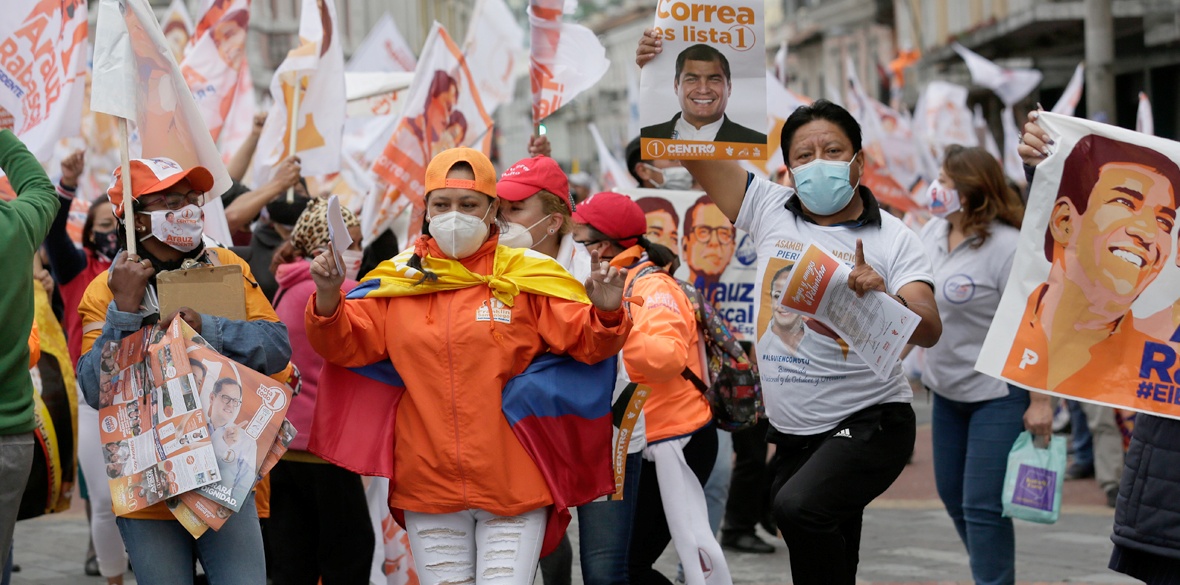
THE PEOPLE ARE ON THE MOVE: Supporters of Andres Arauz, presidential candidate for the alliance "United for hope" dance during a rally in Quito, Ecuador last Tuesday
A 35-YEAR-OLD left-wing economist, Andres Arauz, looks set to become the next president of Ecuador in elections this Sunday.
This would be the latest comeback fres Arauzor the socialist left in Latin America. But only if the elections are allowed to go ahead.
No region has had such an influence on the Western left in recent years as the “pink tide” of progressive Latin American governments elected since the turn of the century.
At a time when many were declaring “the end of history” and the final triumph of the free market, leaders such as Hugo Chavez and Evo Morales showed that not only is there an alternative, but that it had to be based on socialism.
Ecuador under president Rafael Correa was a key part of that wave of left victories and during his decade in office, the nation of just 17 million people punched well above its weight.
Ecuador significantly reduced poverty, nationalised oil resources to fund huge increases in public investment, cancelled foreign debts that had directed huge sums away from public services, made the wealthy pay their taxes, kicked out the region’s largest US military base, gave asylum to Julian Assange and became the headquarters for the Union of South American Nations (Usan/Unasur) that opposed US domination of the region.
. . .
In a sign of just how desperate the Ecuadorian elite is, the authorities have even banned the Arauz campaign from using the images and voice of Correa in campaigning materials in a blatant form of political censorship.
More:
https://morningstaronline.co.uk/article/f/socialism-on-the-cards-in-ecuador
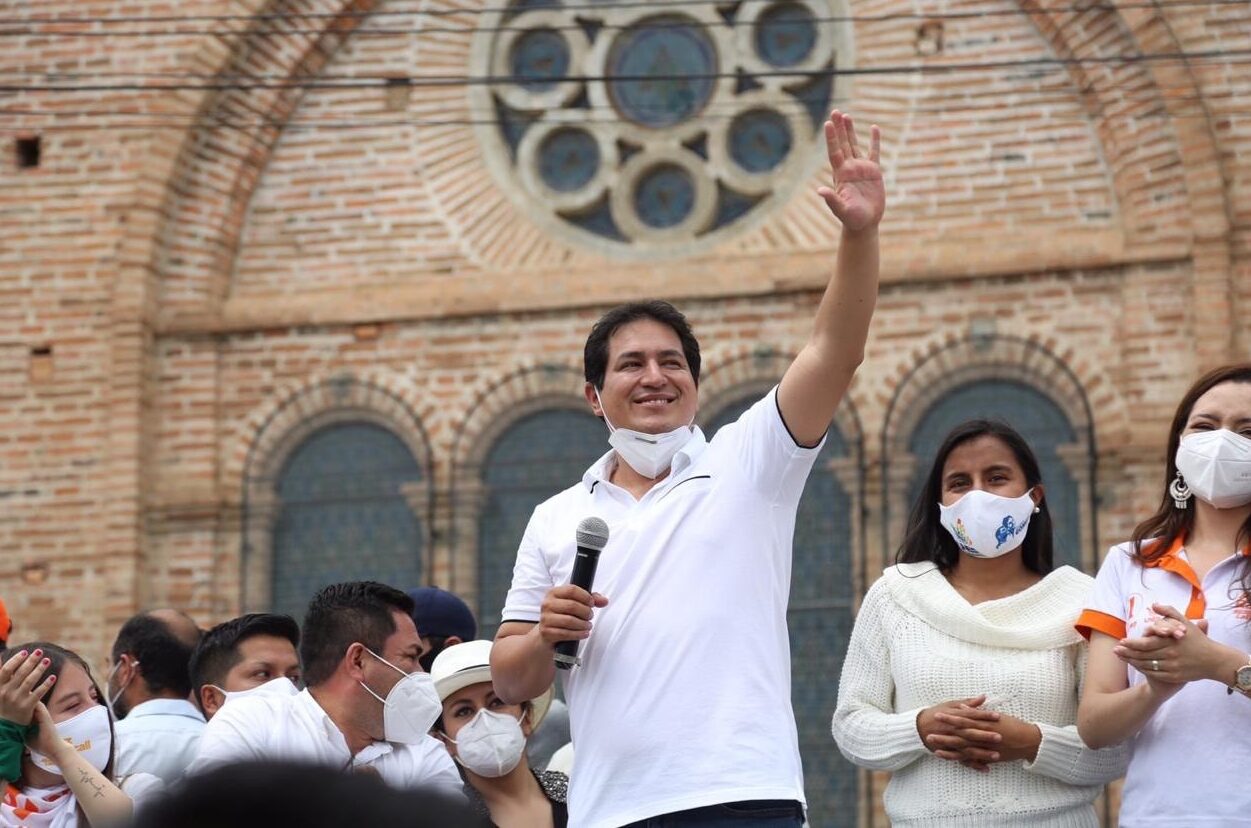
Best wishes to Andres Arauz and Ecuador.
Profile Information
Member since: 2002Number of posts: 160,634